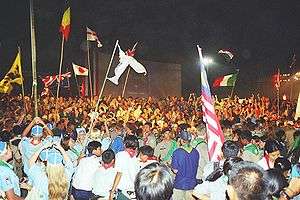Jamboree (Scouting)

In Scouting, a jamboree is a large gathering of Scouts who rally at a national or international level.
The 1st World Scout Jamboree was held in 1920, and was hosted by the United Kingdom. Since then, there have been twenty three World Scout Jamborees, hosted in various countries, generally every four years. The 24th World Jamboree is to be held in North America in 2019.
There are also national and continental jamborees held around the world with varying frequency. Many of these events will invite and attract Scouts from overseas.
Etymology
According to the Canadian Oxford Dictionary, the etymology is "19th century, origin unknown". The OED identifies it as coming from American slang and identifies a use in the New York Herald in 1868 and in Irish writings later in the 19th century.[1] Robert Graves in The Crowning Privilege: The Clark Lectures, 1954–1955 suggests Baden-Powell might have known the word through his regiment's Irish links rather than from the US slang. Poet Robert W. Service used the term well before the first Scouting jamboree. It appears in the poem "Athabaska Dick" in his Rhymes of a Rolling Stone, which was published in 1912. At the time, the word meant a rowdy, boisterous gathering.
Baden-Powell was once asked why he chose "jamboree". He replied, "What else would you call it?", a response that makes sense if the word already means a boisterous gathering.
Nonetheless, it is popularly believed within the Scout Movement that the word was coined by Baden-Powell. It is said that the word has several possible origins, ranging from Hindi to Swahili to Native American dialects. It is said that the name is derived from the Swahili for hello, Jambo!, as a result of the considerable amount of time he spent in the region. It is also said that the word is related to corroboree, a term corrupted by the European settlers of Australia from the Aboriginal word caribberie meaning a ceremonial meeting of Aboriginals involving singing and dancing.
Baden-Powell chose the name as rally, meeting and gathering did not fully capture the spirit of this then-new concept. At the first world jamboree at Olympia in 1920, Lord Baden-Powell said "People give different meanings for this word, but from this year on, jamboree will take a specific meaning. It will be associated to the largest gathering of youth that ever took place."[2]
Olave, Lady Baden-Powell, coined the term jamborese to refer to the lingua franca used between Scouts of different languages and cultural habits, that develops when diverse Scouts meet, that fosters friendship and understanding between Scouts of the world. Sometimes the word jamborette is used to denote smaller, either local or international, gatherings.[3]
Girl Guides rarely use the term jamboree for their gatherings. Girl Scouts, however, do use the word.
International jamborees
- World Scout Jamboree, a gathering of Scouts from all over the world
- World Scout Jamboree on the Air (JOTA)
- World Scout Jamboree on the Internet (JOTI)
- Jamboree on the Trail (JOTT) is an international day of hiking
- Africa Scout Jamboree
- Arab Scout Jamboree
- Asia-Pacific Scout Jamboree
- Caribbean Scout Jamboree, a gathering of Scouts from the Caribbean
- Central European Jamboree, a gathering of Scouts from Central Europe
- European Scout Jamboree, a gathering of Scouts from all over Europe
- Interamerican Scout Jamboree, a gathering of Scouts from the Interamerican Scout Region
- Essex International Jamboree, a gathering of 7,000-9,000 Scouts and Guides from all over the world, held since 1927
- World Federation of Independent Scouts World Jamboree, a gathering of Scouts of the World Federation of Independent Scouts
- Jamboree 2008 (Northumberland), a celebration of the 1908 Humshaugh camp
- Homenetmen General Jamboree, a gathering of Scouts of the Homenetmen
National jamborees
- National Scout jamboree, Boy Scouts of America
- Canadian Scout Jamboree, a gathering of Scouts from Canada
- Australian Scout Jamboree, a gathering of Scouts from Australia and the Asia-Pacific Region
- Nippon Jamboree, a gathering of Scouts from Japan
- Nawaka, a gathering of Sea Scouts in the Netherlands
- Irish Scout Jamborees
- New Zealand Scout Jamboree
- Girl Scout Senior Roundup
- Gathering of Scouts and Guides in India
See also
References
- ↑ "jamboree, n.". OED Online. September 2013. Oxford University Press. http://www.oed.com/view/Entry/100700?redirectedFrom=jamboree (accessed October 07, 2013).
- ↑ John S. Wilson (1959), Scouting Round the World. First edition, Blandford Press. p. 238
- ↑ John S. Wilson (1959), Scouting Round the World. First edition, Blandford Press. p. 122
External links
| Look up jamboree in Wiktionary, the free dictionary. |
| Wikisource has original text related to this article: |
- Jamboree history scout.org
- Klíč 2008 - Czech national jamboree in Pilsen
- Flamboree - Flemish National Jamboree in Belgium
- Lithuanian Scouts Jamboree
- C-Jam 2008 - New Zealand National Jamboree in Christchurch
- BSA 2010 100th Anniversary Jamboree
- K2BSA at the 2010 National Scout Jamboree
- Canadian Jamboree Badge Reference Page